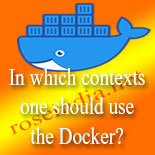When to use Docker - In which contexts one should use the Docker?
Docker with its lightweight virtualization and almost zero overhead offers the user an extra layer of abstraction. Docker Containers with an ability to start and stop in milliseconds can be run on a single machine.
Let us try to understand some of the use cases that extend a consistent environment at low overhead in a supportive technology of Docker.
1. Docker always focuses on simplifying a configuration. Docker puts the configuration files into code and passes through env variables for different environments deployably. Therefore, the same docker image is usable in different environments. The platform offers an ability to run applications with its own configuration ignoring virtual machine.
2. This simplification of configuration is necessary to manage the code pipeline adeptly . During its journey from the developer’s machine to production, code faces different environments with supposedly a minor impact along the way.
Docker eases the process of code development and deployment pipeline. Since the Docker images are immutable in and can be easily spun up, users experience a zero change in application runtime environments.
3. Developer's Productivity observes an optimum level when it experiences a development environment as conducive as possible for a production and secondly, as fast as possible for interactive use .Docker runs a few dozen services inside different containers on a friendly development
environment because of its low overhead and low memory capacity.
And Docker’s shared volumes allows the container to avail the application code from the host OS, opens up the opportunity to edit from developer's platform and thereby speeds up the production.
4. An easy App Isolation often in a bid to separate a monolithic one into decoupled pieces makes Docker attractive for a developer. For instance, if one needs to run two REST API servers, each of them having a slightly different version of apache and other such dependencies, a “dependency hell” finds the way.
5. Docker with its application isolation abilities generates a cost-effective multiple server consolidation without the memory footprint of multiple OS. It has the ability to share unused memory across the instances.
5. Docker posses a Debugging Capability by offering tools not specific to containers, but well-tuned with the concept of containers.
6. Docker offers multi-tenancy in applications. It helps to develop quick and easy multi-tenancy for an IoT application. Multi-tenant applications are built on complicated and rigid code based.
Docker performs well to create easy and inexpensive isolated environments to room multiple instances of app tiers for each tenant. This was possible given the spin up to a speed of Docker environments and it’s easy-to-use API, which we can use to spin containers programmatically.
7. The quality of fast creation and Rapid Deployment of the containers in milliseconds by not booting up an OS, has made Docker an enamoured platform for the developers. The immutable nature of Docker images assures the working roadmap to reach the desired destination.
Conclusion
Docker enjoys a layered file system and the ability to apply version control to entire containers. The benefits of being able to track, revert and view changes is a highly desirable and widely-used feature in software development. Docker's ability to track, revert and view changes makes the developer cosy to work effortlessly.
Docker Tutorials and helpful articles
Check following tutorial and articles:
